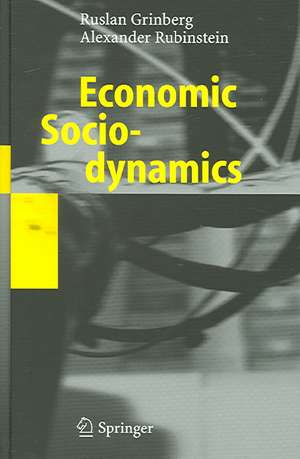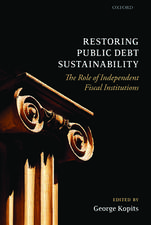Economic Sociodynamics
Autor Ruslan Grinberg, Alexander Rubinsteinen Limba Engleză Hardback – 24 feb 2005
Toate formatele și edițiile
| Toate formatele și edițiile | Preț | Express |
|---|---|---|
| Paperback (1) | 635.65 lei 6-8 săpt. | |
| Springer Berlin, Heidelberg – 14 oct 2010 | 635.65 lei 6-8 săpt. | |
| Hardback (1) | 640.06 lei 6-8 săpt. | |
| Springer Berlin, Heidelberg – 24 feb 2005 | 640.06 lei 6-8 săpt. |
Preț: 640.06 lei
Preț vechi: 753.01 lei
-15% Nou
Puncte Express: 960
Preț estimativ în valută:
122.51€ • 133.12$ • 102.98£
122.51€ • 133.12$ • 102.98£
Carte tipărită la comandă
Livrare economică 21 aprilie-05 mai
Preluare comenzi: 021 569.72.76
Specificații
ISBN-13: 9783540237549
ISBN-10: 3540237542
Pagini: 200
Ilustrații: VI, 188 p. 4 illus.
Dimensiuni: 155 x 235 x 17 mm
Greutate: 0.41 kg
Ediția:2005
Editura: Springer Berlin, Heidelberg
Colecția Springer
Locul publicării:Berlin, Heidelberg, Germany
ISBN-10: 3540237542
Pagini: 200
Ilustrații: VI, 188 p. 4 illus.
Dimensiuni: 155 x 235 x 17 mm
Greutate: 0.41 kg
Ediția:2005
Editura: Springer Berlin, Heidelberg
Colecția Springer
Locul publicării:Berlin, Heidelberg, Germany
Public țintă
ResearchCuprins
To the Reducibility Hypothesis.- Meritories and Social Interest.- The Autonomous Interest of Society.- The Principles of Economic Sociodynamics.- The Realization of Social Interest.- The Individual, the State and Society.- The Rational Behavior of the State.- Instead of a Conclusion….- Economic Sociodynamics: Variations on a Given Theme.
Textul de pe ultima copertă
Grinberg and Rubinstein have written a profound treatment of one of the persistent mysteries of pure economics: how best to treat the "common good" or "social interest." Their discussion of the role of "passionaries" who incorporate the vision of a society`s future is brilliant, deeply rooted in Russia`s recent experience, and it provides a test of civilization and democracy which not very many nations in today`s world would pass.
James K. Galbraith, Lloyd M. Bentsen, jr. Chair in Government/Business Relations, Lyndon B. Johnson School of Public Affairs, The University of Texas at Austin
A groundbreaking study of rational principles for the modern state to follow in promoting economic and social progress. Explains why more thoughtful and well meaning government intervention is a must today, not irrational passivity. Highly sophisticated but exceedingly pleasant reading.
Stanislav Menshikov, Professor of Economics, Co-Chair, Economists Allied for Arms Reduction (ECAAR) in Russia
Professors Grinberg and Rubinstein have presented, in their new book, a revolutionary approach to economic theory that they call "economic sociodynamics." Their "third way" represents both an extension of received economic theory and a challenge to it in its conception of the individual and the state. They question the reliance on individualism in current theory and creatively treat the state as an independent player in a market economy, exploring the implications of such an approach. In fact, this new theory has many important implications in a variety of areas. This is a provocative book that deserves serious consideration and appreciation.
Michael D. Intriligator, Professor of Economics, Political Science, and Policy Studies, UCLA
I have read the manuscript with great interest and appreciation. The authors offer a sweeping discussion, beginning with my early travails with the merit good concept and its development over the years, and moving on to a wide range of related contributions, and the derivation of their own interpretation. I trust the volume will rekindle and extend this discussion, and for this I am indebted to both authors.
Richard A. Musgrave, Emeritus Professor, Harvard University
The complex structures of the globalized world, which limit the scope to maneuver for economic and politic actors while simultaneously increasing the need for meaningful action, raise the demand for new theoretical concepts. Grinberg`s and Rubinstein`s "Economic Sociodynamics" offer an inspiring alternative to traditional theories, proved in the past but insufficient in a world full of new challenges.
Hans-Hermann Höhmann, Professor of Economics, Research Centre for East European Studies, University of Bremen
In this ambitious book the authors challenge mainstream economic theory by reconsidering the principle of individualism as its foundation. They refer to that version which fails to recognize the existence of the interests of society as such, and does thus exclude the role of the state as an independent market player seeking to realize these interests. The outcome is a new theoretical concept called "Economic Sociodynamics". The book reveals in detail the said concept, in particular its key notions of the sociodynamic multiplier and the rational behavior of the state.
James K. Galbraith, Lloyd M. Bentsen, jr. Chair in Government/Business Relations, Lyndon B. Johnson School of Public Affairs, The University of Texas at Austin
A groundbreaking study of rational principles for the modern state to follow in promoting economic and social progress. Explains why more thoughtful and well meaning government intervention is a must today, not irrational passivity. Highly sophisticated but exceedingly pleasant reading.
Stanislav Menshikov, Professor of Economics, Co-Chair, Economists Allied for Arms Reduction (ECAAR) in Russia
Professors Grinberg and Rubinstein have presented, in their new book, a revolutionary approach to economic theory that they call "economic sociodynamics." Their "third way" represents both an extension of received economic theory and a challenge to it in its conception of the individual and the state. They question the reliance on individualism in current theory and creatively treat the state as an independent player in a market economy, exploring the implications of such an approach. In fact, this new theory has many important implications in a variety of areas. This is a provocative book that deserves serious consideration and appreciation.
Michael D. Intriligator, Professor of Economics, Political Science, and Policy Studies, UCLA
I have read the manuscript with great interest and appreciation. The authors offer a sweeping discussion, beginning with my early travails with the merit good concept and its development over the years, and moving on to a wide range of related contributions, and the derivation of their own interpretation. I trust the volume will rekindle and extend this discussion, and for this I am indebted to both authors.
Richard A. Musgrave, Emeritus Professor, Harvard University
The complex structures of the globalized world, which limit the scope to maneuver for economic and politic actors while simultaneously increasing the need for meaningful action, raise the demand for new theoretical concepts. Grinberg`s and Rubinstein`s "Economic Sociodynamics" offer an inspiring alternative to traditional theories, proved in the past but insufficient in a world full of new challenges.
Hans-Hermann Höhmann, Professor of Economics, Research Centre for East European Studies, University of Bremen
In this ambitious book the authors challenge mainstream economic theory by reconsidering the principle of individualism as its foundation. They refer to that version which fails to recognize the existence of the interests of society as such, and does thus exclude the role of the state as an independent market player seeking to realize these interests. The outcome is a new theoretical concept called "Economic Sociodynamics". The book reveals in detail the said concept, in particular its key notions of the sociodynamic multiplier and the rational behavior of the state.
Caracteristici
A new theoretical concept, a new view on modern economic reality


















